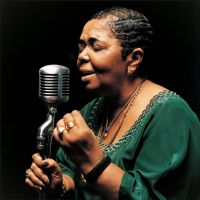| B i o g r a p h y |
 Her
music is Coladeras and Mornas, European sounding styles whose roots
date back to the 1800s, when Cape Verde's port was an important halfway
station for Atlantic trading.Musical influences have dribbled in from
all corners of the globe, but the most dominant are those of the former
colonials Portugal, Angola and Brazil.The Cape Verde Islands have been
stamped by an ever-changing population. When the Portuguese arrived in
the islands and took control in 1460 there were no permanent
residents.Lying out in the Atlantic Ocean, about 350 miles off the
coast of West Africa, meant the 12 islands were well placed to become
supply bases for sailing ships.Bit by bit the plantations were built
up, worked by slaves. Cape Verde was a Portuguese colony for 400 years
in all. The Islands' inhabitants are descendents of Portuguese and
slaves. "My songs are about loss and longing, love, politics,
immigration - and reality. We sing about our land; about the sun; the
rain that never comes; about poverty and problems; how the people on
Cape Verde live," says Cesaria Evora.
Her
music is Coladeras and Mornas, European sounding styles whose roots
date back to the 1800s, when Cape Verde's port was an important halfway
station for Atlantic trading.Musical influences have dribbled in from
all corners of the globe, but the most dominant are those of the former
colonials Portugal, Angola and Brazil.The Cape Verde Islands have been
stamped by an ever-changing population. When the Portuguese arrived in
the islands and took control in 1460 there were no permanent
residents.Lying out in the Atlantic Ocean, about 350 miles off the
coast of West Africa, meant the 12 islands were well placed to become
supply bases for sailing ships.Bit by bit the plantations were built
up, worked by slaves. Cape Verde was a Portuguese colony for 400 years
in all. The Islands' inhabitants are descendents of Portuguese and
slaves. "My songs are about loss and longing, love, politics,
immigration - and reality. We sing about our land; about the sun; the
rain that never comes; about poverty and problems; how the people on
Cape Verde live," says Cesaria Evora.
Cesaria Evora's main strength as a vocalist is the authority with
which she sings. She is first and foremost an interpreter of others'
lyrics and melodies, including her uncle's. She sings straight, without
vibrato. She pronounces the lyrics, in Creole, with a distant ease that
is never overdone. Her many, often bitter, experiences can be heard in
a voice that indicates a life lived. Cesaria Evora has been married
three times and deserted three times. In her expression she reminds one
of Billie Holiday or Edith Piaf, but does not like to be compared with
them. "Each singer has her own expression," says Cesaria, who has been
called "the barefoot diva" because she simply prefers to perform
without shoes. Cesaria Evora is loyal to Cape Verde. Despite having
become an international Artist who tours the world she continues to
reside in her hometown, Mindelo, on the island of Sao Vicente. It was
there she lay the foundations of her incredible career. For many years
she performed in Mindelo's bars, starting at the age of 16. She began
singing with a group in which her boyfriend played - and stayed. Life
as a bar singer was tough, like life in Cape Verde. After many years
performing in dives, she tired of being a singer. For a decade, between
1975 and 1985, she didn't perform at all. In 1988 she met producer Jose
da Silva, a native of Cape Verdi who grew up in Dakar and Paris.Da
Silva made it his mission to make a star out of Cesaria Evora. He let
her perform for the Cape Verde's exile community in Paris. Jose da
Silva established the Lusafrica record company in 1988 and that same
year Evora made her debut album, "La Diva Aux Pieds Nus", in Lisbon.
With "Miss Perfumado" in 1992 her career took off at speed.This was her
springboard into the international world of music."Miss Perfumado" sold
more than 500,000 copies and earned her five gold records. In all,
Cesaria Evora has released 8 original albums and won many prizes - one
from UNESCO - as a leading African singer. She has also been nominated
three times for an American Grammy award.